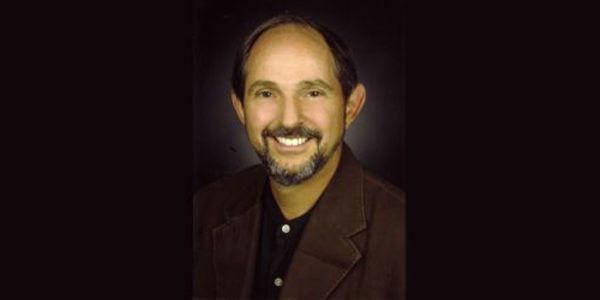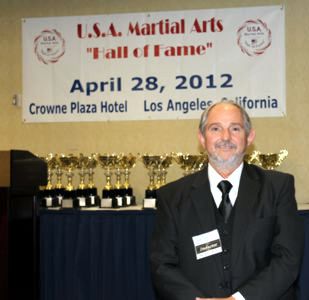
USAdojo: Gordan, you are an incredible man. You just released your second novel, The Panda Chronicles. You received your second-consecutive Book of the Year Award from the Legends of the Martial Arts Hall of Fame for your book The Five Principles of Everything and you were honored at the USA Martial Arts Hall of Fame Awards as Author of the Year in April.
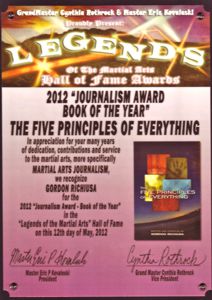
Everyone recognizes your name from the hundreds of published articles you write about other people, especially martial artists. You have partnered with people like Jhoon Rhree, Alfred Urquidez and Frank Dux to create the Legends and Legacies series here on USAdojo.com and you have interviewed many of the greatest martial artists of the past and the present. How have your recent novels, and this latest non-fiction book, The Five Principles of Everything, been different from what you normally write?
Gordon Richiusa: Although I consider myself a martial artist first–I have earned rank in more than one style, and have almost 50 years of experience–most people think of me as a writer. The reason for this is mostly of my own doing, because until two years ago, I never wrote anything about myself. In fact, when I wrote about martial arts in the past or other disciplines where I might be considered an authority, for publications such as Black Belt, Karate Illustrated etc., even if I knew a lot about a subject I always found someone else to interview. I am a member of the National Writers Union and hold International Press Credentials issued by the International Federation of Journalists. As such, putting myself into the story or voicing an opinion goes against the precepts of journalistic integrity. However, I am also a lover of words and admirer of great storytelling. I have a Masters in English Literature, and am certified to teach writing courses at the college level. The central characters in my first two novels, Shidoshi: The Four Ways of the Corpse and The Panda Chronicles are both based upon real experiences and characters, and there always is a thread of martial arts interests running through the stories. I tell my writing students, for instance that they should “write what they know,” somehow relating everything to an area that they know best. I haven’t always been good at this, but I follw my own advice when it comes to writing. On the other hand, I’ve always believed that it was safer and better to be Tanto or Dr. Watson, rather than The Lone Ranger or Sherlock Holmes. This probably comes from the fact that I have been associated with people who were lightening rods of controversy and scrutiny. Originally I wrote The Panda Chronicles, for instance, to be read as testimony for a real-life undercover drug cop named Rico Rose. I interviewed Rico about his cases and about an incident where he was shot by one of his own men during a drug-bust and he read that book into testimony when he sued for (and won) a large settlement against the cities of Los Angeles and San Fernando. Shidoshi is based loosely upon the character of Frank Dux and a story that he told me almost thirty years ago. In both cases, I had performed my journalistic duty to report the truth in the proper contexts, but I also saw that there was potential to improve upon reality and create even better stories. That’s what I did with my novels, Shidoshi and Panda Chronicles. I simply took the truth and made it better, as my Goju Ryu instructor, Mike Eaves used to say about my writing style. The error of many fledgling fiction writers and journalists is that they don’t understand the difference between the two. They either try to stick too closely to reality and end up with boring fiction, or create words and events, with opinions and speculation and call it journalism. There are distinct differences.
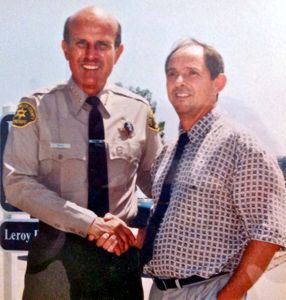
USAdojo: So where does The Five Principles of Everything fit in with your novels?
Gordon Richiusa: The Five Principles of Everything is definitely non-fiction. It is my own application of five principles, based upon core human values that I learned in my decades of martial arts training. These are the principles that I apply to the situations in life. I did not make-up these principles, but rather I am showing how I’ve applied what I’ve learned over the years. In fact, the book is also a collection of essays from 16 notable contributors–many are martial artists–whose collective purpose is to help people learn to solve their problems before they occur by applying this same strategic approach to everyday life.
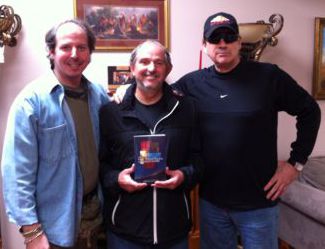
USAdojo: That’s what we are always told is the real purpose of ALL martial arts training.
Gordon Richiusa: Exactly!
USAdojo: So what are these five principles that you live by and who are the contributors that also try to live by these principles?
Gordon Richiusa: That’s a great way to ask that question! In the book I mention that these are not the only principles by which we can live our lives. They just happen to be the five that have suited and served me—and the 16 contributors. I give credit to people like Sun Tsu, Myamoto Musashi, Carlos Castaneda, and even Albert Einstien or Thomas Jefferson for pointing me in the right direction. The contributors include people like Steve Galvanoni (a very successful businessman who shows how to apply the five principles to business), or Barbara Rich (who has contributed pages of her Gradual Diet to the overall text). In addition to educators, politicians, psychologists, writers and even tennis players; we also have Jhoon Rhee who has given pages from his book Trutopia, Alfred Urquidez (who gives a final statement as a representative of an illustrious martial arts family as well as a member of the Blackfoot and Apache nations) and Frank Dux who outlines the five principles of his FASST program, among many others.
USAdojo: I was happy to be included in that illustrious group, and I learned from everyone who contributed.
Gordon Richiusa: Every one of the contributors said that. That’s how I always felt when I was writing news stories, and how I can tell someone is a journalist at heart. Let’s get back to your question about the five principles, however. I point out in the introduction to the book that human beings have certain characteristics and traits in common. We look for patterns in the universe and try to find meaning in our own lives by seeing how The Big Picture, or how the universe seems to function without us, and the little picture, or how we are best able to achieve happiness are basically following the same patterns. Following a five principles approach is looking for commonality as a point of departure in every activity. In brief, we have 1) the Principle of Applied Awareness, 2) the Principle of Form, 3) The Principle of Flow, 4) The Principle of Benefit and the 5) The Principle of Harmony. The first principle, the principle of Awareness is also called the principle of Applied Awareness, and basically acknowledges how much we as human beings, value awareness, knowledge, and understanding. As with every principle, there are many different layers and applications but are always based upon human traits and characteristics. One of the layers of this principle is that “perspective is everything.” In every situation we gather information and make judgments or take action based upon that information. More importantly, the principle of awareness states that “how we think about everything” has important effects. In problem solving we always have to keep in mind, “what it is we are trying to accomplish.” Once we are convinced that our thoughts are focused in the right direction, because they don’t violate any of the other principles of the universe, then we cannot be diverted. On the other hand, we are only human and sometimes find what we think are truths when in fact we are just finding what we want to find.

Questioning, wondering, thinking, believing, and knowing are all similar, but slightly different representations of human awareness. Looking for patterns, solving problems and constantly asking the questions, “Why?” or “How do I make things better,” are also ingrained in each us. Paying attention to these Core Human Values, such as acknowledging how humans think, a good teacher will allow students to “discover answers” for themselves, rather than just blindly follow a prescribed formula. I’ve always said, “a person can never be closer to The Creator, than when they are being creative.
USAdojo: How does this apply to martial artists or to your other favorite professions, such as writing?
Gordon Richiusa: In martial arts classes we are always told that we are learning to live by a higher moral and ethical code, that our actual goal is not really harming others, but self-defense or defense of the defenseless. What we REALLY want is to be safe. Sometimes a style is born that is pure offense, based upon the narrow belief that because a strategy may have “won the battle” that it is a good strategy to employ for the rest of ones life. What comes to mind is the “best defense is to strike first” theory. Remember, “martial” refers to anything that relates to war. The word is derived from the name of the Roman god of war, Mars. We’ve seen throughout history however that humans have an aversion to sneak attacks. Unless an imminent threat has been established, then sneak attacks appear to violate our moral codes. In fact, I’d have to say that MOST of the rules we’ve made around the globe, as a species, relate to killing or the prevention of one person or group doing harm to another. In writing, we ask ourselves: What is it we are trying to accomplish? The answer should be “to communicate”. There is really no other reason to write anything down. Yet, sometimes people write things to deceive or to obscure the truth. We can see that writing for those purposes is simply wrong. Learning to punch and kick so that you can bully others will never make you a martial artist.
USAdojo: That leads us to the Principle of Form, or the way we should live, correct?
Gordon Richiusa: That’s right. There are lots of ways to accomplish the same thing. There are many different ways to write and communicate. Some we call inspirational or artistic. Other writing is awkward or uncommunicative, usually because it violates basic structural requirements. There are many different styles of martial arts, but all are basically the same. They all deal with some aspect of combat. All styles are bound by the laws of physics, and the physical limitations of the human form, though. Some ways appear to violate our innate moral codes. We say these violate The Five Principles or the principles of the universe. Others might say that these violations are sins, or against God’s rules. The Five Principle perspective is that, regardless of whether you believe in a Supreme Intelligence or how that intelligence is manifested in your personal system, there seems to be “ways” or “forms” that reflect the orderly and proper workings of the Universe. We call these Universal Principles and say that our actions as humans should reflect our desire to follow the flow of those principles, rather than oppose them. Our ultimate purpose in life is to find a form or way to live that represents our understanding of these basic principles.
USAdojo: Flow is the third Principle of Everything, which is the way things react to each other, right?
Gordon Richiusa: Yes. Simply put, there is always a movement or action associated with everything. The universe not only favors motion, but coordinated movements, alignments and continued references to the relationship of the kind of Action that will work best, based upon the Form, Information and the Benefit desired are often the difference between success and failure. In everything from relationships, to buying stocks, to martial arts, to comedy writing we often hear the phrase, “Timing is everything.” I’ve said before that I studied Goju Ryu. The word, Goju means, hard-soft, and is based upon an old Zen proverb that states: The Universe breathes both hard and soft. This meant, in my teacher’s understanding of it, that there are times to move quickly and hard and times to move slower and more softly. If the Universe itself acknowledges success at changing rates, then we should too.
USAdojo: You mention Benefit in there. Since that is one of the Five Principles of Everything, could you elaborate?
Gordon Richiusa: As with all of the Five Principles, there are many different aspects of each principle. In this case, let’s look at it from just two angles. First, the principle of Benefit allows each individual to ask, “What’s in it for me?” or “What benefit am I going to get out of my actions?” Everyone wants to know that they are “getting theirs,” and that’s o.k. But, as with all the principles, we cannot make the mistake that any ONE of the principles is the ONLY principle that must be acknowledged. That’s very dangerous thinking, because people might consider the possibility that any action is justified, that anything goes, as long as they are “getting theirs”. To prevent this, we sometimes refer to this principle as the Principle of “Mutual Benefit.” It is the kind of thinking that allows for Conflict Avoidance, rather than just winning an argument. It’s an understanding that acts of kindness to others actually have a beneficial effect on the person who is acting kindly. The book itself, The Five Principles of Everything is, in fact an example of this one principle as much as any thing else. The contributors to the book did not write their pieces and I did not step to the forefront as the main author of this book because we were trying to “get ahead of everyone else.” Everyone contributed to the final book, not because they were going to get something for themselves at the expense of others, but because “it is the right thing to do.” In fact, I have to say that the column, Legends and Legacies is written in that same spirit. As soon as we finished the editing of the manuscript of the book, we began the process of sending a FREE COPY to every member of Congress, every state governor and every member nation representative at the United Nations and every other world leader. These are all examples of Mutual Benefit.
USAdojo: So, when a martial arts grandmaster of a style attacks the reputation of another martial artist…
Gordon Richiusa: That’s a violation of the principle of benefit. Within any contact or form, in the pursuit of truth each individual benefits ONLY if everyone benefits. As martial artists we have a greater responsibility to make sure that we understand this basic principle. Human beings are naturally social animals and, in a way, it’s in our DNA to want to fit into the group. The teachers of those styles that begin and end with positive teachings that benefit everyone in society, know that they are making themselves stronger and safer and happier with every student who a code of ethics in their training. That’s the old children’s saying, “What goes around comes around.” Again, though we have to be careful that we don’t get fooled by words, or cleverness thinking that Awarness is really the only important issue. It’s like someone saying that it’s o.k. to put oil or plastic into the ocean because they saw someone else spit into it. You might actually feel some sort of reactionary emotion against someone spitting, but the truth of the matter is that as soon as spit goes into the ocean, it is completely nullified. That’s where they get the expression, “a spit in the ocean.” But, even a drop of oil or a small piece of plastic changes the composition of the ocean—though by a small degree—to the negative. No matter how disgusted you are by someone else’s spit, or what their intention was in spitting, the fact is that oil and plastic are worse because it benefits all of us to keep oil and plastic out of the ocean. There are no negative effects of the spit other than our emotional aversion and therefore, we need not waste one moment of energy on worrying about, making laws or creating organizations that are against spitting in the ocean, when all we really want to do is sell oil. There is nothing wrong with supplying energy for people, even in exploring options for safely utilizing fossil fuels in ways that don’t destroy the environment. It’s just wrong to pretend that climate change is or is not occurring simply because it might affect a company’s bottom line.
USAdojo: In The Five Principles you use the example of being a lifeguard to represent the proper application of all five principles. How and why did you come up with that comparison?
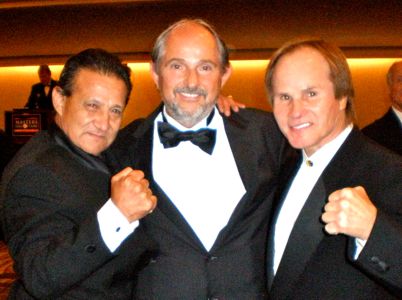
Gordon Richiusa: Well, this will be a good way to wrap this interview up. The final Principle of Everything is something we call, The Principle of Harmony, Balance or Adaptability. As we’ve said, no one principle is more important than any other. In fact, understanding that things change and that we must adapt to new conditions is again fundamental in a successful strategy. Both Mike Eaves and Frank Dux emphasized to me that we are different, and therefore must logically perform basic movements differently, but there are immense similarities in all the movements and in the REASONS for performing them. This is VERY important in the TEACHING of martial arts principles, as well as in the performing of martial skills. Just on the surface, there are men and women with generally different strengths and weaknesses. Within that there are tall people, short ones, muscular or slight builds etc. Some people favor kicking or punching or knives or swords or short staff or long or archery or handguns. Some people have a relatively high level of competence in more than one area. A knife can cut to kill or be a scalpel that saves a life. When I was training for my black belt in GoJu Ryu, my teacher brought a bag full of weapons to a workout and told each student to pick one. I, luckily chose the jo, a short staff of 50 inches. The teacher then said, “Now, you can’t put it down for one week. When you come back next week, we will continue with the lesson.” I was in college at the time, like many of my fellow students, so that meant that we were going to have to bring whatever we’d chosen to class, or to our jobs if we had one. It was relatively easy to carry around a walking stick everywhere I went, but some people picked katana, or sai or even nunchaka. Learning how to get in or out of a car with a sword or staff and keep it concealed is a great place to start training with those weapons. When we came back the next week, we compared notes and then were told that ALL of the various weapons were used as EXTENSIONS of our hands and feet! What we were REALLY trying to accomplish was how to use tools to improve our ultimate goal of protecting ourselves. Some people picked new weapons and started over. Others, like myself, stayed with the original choice and then added to that later. I still practice with my jo every morning at sunrise, when I do my tai chi. To personalize this lesson further, I was a lifeguard when I was younger. I even taught WSI classes for the Red Cross and at CSU Northridge, where I went to school. In lifeguarding, what we are REALLY trying to accomplish is NOT saving people after they are in trouble. Lifeguards don’t feel particularly successful if “most of the people they were watching didn’t drown completely.” A good lifeguard makes sure that danger is at a minimum at their station. They PREVENT problems by making sure that people in the water stay at their level of skill. If someone can’t swim, they are kept out of the deep end. If the deck at a pool is wet, there is no running, etc. I raised and trained my children the same way I taught martial arts to cops. Things don’t always go according to plan. We train for every conceivable circumstance, always understanding that circumstances change. However, within every context there are overriding tendencies that we have as human beings. There is always “something we are trying to accomplish,” a form, or parameters that we must stay within, some driving motivation for what we are doing and a natural schedule, timetable or flow of events that are signposts or measurements for success. Every successful life strategy is also adaptable.
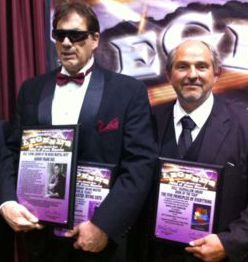
USAdojo: That’s why you have 16 varied contributors to The Five Principles of Everything text?
Gordon Richiusa: I happen to think that good martial arts training techniques and solving every problem with a code of ethics, as I learned from my martial arts teacher, can help us develop a blueprint for ANY life strategy. I’ve also now decided that I don’t have to hide behind others, but am still interested in seeing the world through other people’s eyes. I’ve always been a great admirer of words and storytelling and have always been open to hearing people share their experiences that have shaped and molded them to see the life as a gift. I think that telling personal stories is the best way to teach and the best way to share beliefs without complications. I’m now open to sharing some of my own experiences when I think they may help others in some way. Here’s one for you.
When I was in Alaska a few years ago I learned about some of the myths of the elders that I found fascinating, because these stories related to me and my Five Bird System of martial arts. Two of the most significant Birds on the Alaskan Native’s totem pole are the Eagle and the Raven. In fact, every person of Tlingit descent is considered to be either a Raven or an Eagle person. Raven people always seek out, and usually marry Eagles and visa-versa, for instance. Whenever I travel, I always look for souvenirs that have something to do with one of my five birds. Over the years I’ve found eagle, hawk, owl and even vulture cups, t-shirts etc., but rarely do I find anything with Ravens on it. I thought that here, in a place where EVERYONE is either an eagle or raven, that Raven stuff would be plentiful. That was not the case. I couldn’t find anything with a raven on it. This was also strange because on every totem pole, the raven was there. In many tribes of the northern Americas there is a very important myth regarding the first raven who risks his life to bring a piece of the sun (in some versions, just fire) to all the inhabitants of Earth. Anyway, I was on a cruise ship and at every port I asked local people if they had anything with a raven on it. None did. Until one small shop, owned by a native woman, I went inside and asked the same question, “Do you have anything with a raven on it?” At first she said no. Then, after looking at me kind of strangely, she said, “Who is it for?”
I said, “It’s for me!”
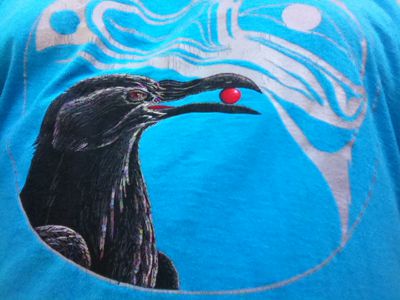 She literally got on her hands and knees and, after lifting a towel that hung over a hole in the wall she crawled inside. A moment later, she came out with a t-shirt, depicting Raven bringing a piece of the Sun to Earth. She said, “I’ve been saving this for someone. You can have it, if you want it.” I thanked her profusely and left. I still wear the shirt and it reminds me that we all have an obligation to bring a piece of the Sun to Earth, if we are able. With the Five Principles of Everything, having these sixteen experts talk about their specific relationship and understanding of the application of the Five Principles approach, and all of us coming from different directions to the same place of “doing the right thing” being more important than personal gain, I have done what I set out to do, so I’m happy.
She literally got on her hands and knees and, after lifting a towel that hung over a hole in the wall she crawled inside. A moment later, she came out with a t-shirt, depicting Raven bringing a piece of the Sun to Earth. She said, “I’ve been saving this for someone. You can have it, if you want it.” I thanked her profusely and left. I still wear the shirt and it reminds me that we all have an obligation to bring a piece of the Sun to Earth, if we are able. With the Five Principles of Everything, having these sixteen experts talk about their specific relationship and understanding of the application of the Five Principles approach, and all of us coming from different directions to the same place of “doing the right thing” being more important than personal gain, I have done what I set out to do, so I’m happy.

